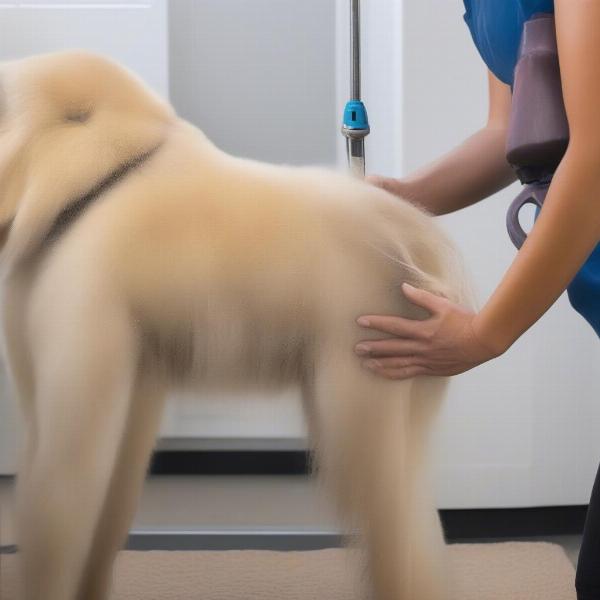Dogs licking their anuses is a common behavior that can be concerning for owners, particularly when searching for information using terms like “lick dog ass gay.” While the search term itself might suggest a specific and potentially inappropriate context, the underlying behavior is a normal part of canine hygiene and can occasionally signal health issues. This article will explore the various reasons behind this behavior, addressing concerns related to health, hygiene, and offering practical advice for dog owners.
Why Do Dogs Lick Their Behinds?
Dogs lick their behinds for a variety of reasons, the most common being cleanliness. The anal glands, located on either side of the anus, secrete a foul-smelling fluid that helps dogs mark their territory and identify each other. Sometimes, these glands can become impacted or infected, causing discomfort and prompting increased licking.
Another reason for this behavior is simple hygiene. Just like cats groom themselves, dogs lick to remove fecal matter or other debris that might be clinging to the fur around their anus. This is particularly common in dogs with long hair or those prone to diarrhea.
Finally, it’s important to rule out underlying medical conditions. Allergies, parasites, and skin infections can all cause irritation and itching in the anal area, leading to excessive licking. If the licking is persistent, accompanied by other symptoms like redness, swelling, or a foul odor, it’s crucial to consult a veterinarian.
Health Concerns Related to Anal Licking
While occasional licking is normal, persistent and excessive licking can be a sign of a problem. Here are some potential health issues to consider:
- Anal Gland Problems: Impacted or infected anal glands are a common culprit. Symptoms include scooting, excessive licking, and a foul fishy odor.
- Parasites: Fleas, ticks, and intestinal worms can cause itching and irritation, leading to increased licking.
- Allergies: Food or environmental allergies can manifest as skin irritation, including the anal area.
- Skin Infections: Bacterial or fungal infections can cause itching and inflammation.
When to See a Vet
If your dog is constantly licking its anus, it’s important to consult a veterinarian. They can determine the underlying cause and recommend appropriate treatment. Look out for these signs:
- Excessive licking, especially if accompanied by scooting or biting at the area.
- Redness, swelling, or discharge around the anus.
- A foul odor emanating from the anal area.
- Changes in bowel movements, such as diarrhea or constipation.
Preventing Excessive Anal Licking
Maintaining good hygiene can help prevent excessive anal licking. Regularly grooming your dog, especially around the rear end, can help remove debris and prevent irritation. A high-fiber diet can also help regulate bowel movements and reduce the likelihood of anal gland problems.  Dog Grooming to Prevent Licking
Dog Grooming to Prevent Licking
Conclusion
While the search term “lick dog ass gay” might lead users to this article with potentially misplaced expectations, understanding why dogs lick their behinds is crucial for responsible pet ownership. By recognizing the difference between normal hygiene and potential health concerns, we can ensure our furry friends receive the appropriate care. If you’re concerned about your dog’s licking behavior, consult a veterinarian for a proper diagnosis and treatment plan.
FAQ
- Why does my dog lick his bum after pooping? This is usually a normal hygiene behavior to clean any remaining fecal matter.
- How can I stop my dog from licking his bum excessively? Consult a vet to determine the cause and appropriate treatment.
- Is it dangerous if my dog licks his bum a lot? It can be a sign of underlying health issues, so it’s best to seek veterinary advice.
- What are the signs of impacted anal glands? Scooting, excessive licking, and a foul fishy odor.
- Can allergies cause my dog to lick his bum? Yes, allergies can cause skin irritation in the anal area, leading to licking.
- How often should I clean my dog’s anal glands? Only if recommended by a vet. Frequent manual expression can cause irritation.
- What can I feed my dog to help with anal gland problems? A high-fiber diet can help regulate bowel movements.
ILM Dog is your trusted resource for comprehensive information on dog care and well-being. We offer expert advice on everything from breed selection to health care, training, nutrition, and grooming. For more insightful articles and personalized guidance, visit us at ILM Dog. Contact us at [email protected] or +44 20-3965-8624 for any inquiries.